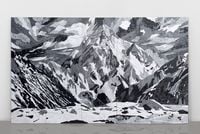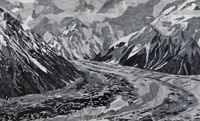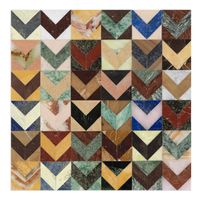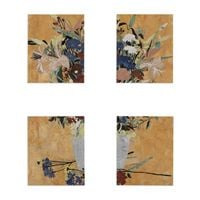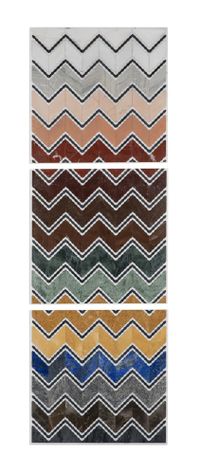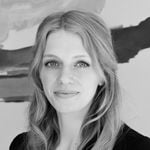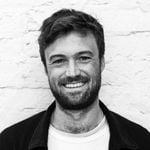Pakistani artist Hamra Abbas explores cultural history, identity, and religion using a broad range of media. Often hybridising or recontextualising historic and contemporary aesthetics, Abbas probes the complexities of Islamic and Western culture in a globalised world.
Read MoreAbbas holds a BFA in Sculpture from the National College of Arts in Lahore, Pakistan (1999). She completed an MA in Visual Arts from the same college in 2002. In 2004, she completed the Meisterschueler programme at Universitat der Kunste Berlin.
Abbas divides her time between Boston, Massachusetts, and Lahore, Pakistan.
Abbas fuses contemporary craft and technology with more traditional media such as painting and printmaking. Having travelled extensively throughout her life, Abbas' work is driven by personal experiences and observations of both Islamic and Western cultural practices.
Abbas often works in series, pushing an area of enquiry repeatedly to develop a comprehensive body of work on a singular subject. She may use an image, symbol, ritual or object and deconstruct or reshape its form to pose questions about its history, context or functionality.
For Paper Plates (2008), the artist collaborated with a paper plate factory in Islamabad to produce delicate paper plates cut with tessellating geometric patterns drawn from traditional Islamic iconography. Visually reminiscent of paper craft snowflakes, or as curator Dr Virginia Whiles has noted, the Victorian lace doily, Abbas' Paper Plates employ cultural symbols to touch on ideas around manufacturing and globalisation.
God Grows on Trees (2007–2009) comprises a series of 99 individual portraits rendered in gouache on wasli paper on a miniature scale, with each measuring just a few centimetres. The hyperreal portraits depict children studying in madrasahs in Pakistan, whom Abbas photographed and subsequently painted. Referencing the God of Islam, whose 99 names are written, recited, and represented in many forms in the Islamic world, Abbas' series articulates yet another ritualistic iteration of these names.
In Cityscapes (2010), a series of panoramic photographs of the Istanbul cityscape, Abbas subtly removed the minarets from the skyline. Produced in response to the 2009 referendum in Switzerland which saw the banning of the construction of new minarets, Abbas' images consider the political implications of religious architecture, in both their presence and systemic erasure.
Abbas has continued her investigation of Islamic architecture in more minimalist, abstract works. The 'Kaaba Picture as a Misprint' series (2014) at first appears as studies of geometry or colour theory, presenting various combinations of offset, layered blocks of colour from the CMYK spectrum. However, Abbas' title hints at further meaning in the form of Islam's most sacred site, here reduced to its most simple geometric form: two rectangles, one on top of the other. By framing the series as 'misprints', Abbas considers the nuances of religious representation and interpretation.
Abbas' later works have further explored tensions between aesthetics and material politics through the manipulation of stone to form geometric and abstract images. The 'Waterfall' series (2022) sees the formation of zigzag patterning and chequered arrows in the variegated brilliant tones of lapis lazuli, onyx, jasper, calcite, serpentine, marble, and sodalite, while the immersive floor installation Garden (2021) depicts a paradisical garden scene in marble and various colourful stones. Inspired by Mughal gardens and utopian scenes depicted in miniature paintings, Abbas' Garden is constructed using traditional Lahore stone inlay techniques. Though visually and technically impressive, Abbas' stone works also bring to mind the potentially fraught origin of their materials – for example, lapis lazuli is predominantly mined in Afghanistan.
Abbas has held numerous international residencies, including with the Civitella Ranieri Foundation, Umbertide (2019); The Marble House Project, Vermont (2016); Nanyang Technological University CCA Singapore Residencies, Nanyang (2015); and the Triangle Artist Residency, New York (2010).
Abbas was the recipient of awards including the Abraaj Capital Art Prize, Dubai (2011); Jury Prize, Sharjah Biennial 9, Sharjah (2009).
Hamra Abbas has exhibited in solo and group exhibitions internationally since the early 2000s.
Selected solo exhibitions include: COLOR/GARDEN, Lawrie Shabibi, Dubai (2022); Every Colour is a Shade of Black, COMO Art Museum, Lahore (2020); Open Cube, Lawrie Shabibi (2019); Gardens in Which Rivers Flow: Plastic Flowers and Everyday Miracles, Art Dubai with Canvas Gallery, Dubai (2019); Colour, Canvas, Karachi, Pakistan (2017); Bodies, Lawrie Shabibi (2016); But Can You Show this in Pakistan?, PILOT, Istanbul (2015); Wall Hanging, Isabella Stewart Gardner Museum, Boston, Massachusetts (2013).
Selected group exhibitions include: Under Construction, Lawrie Shabibi, Dubai (2021); We Do Not Dream Alone, Asia Society Triennial, New York (2020); Between the Sun and the Moon, Second Lahore Biennale (LB02), Lahore (2020); Gateway: Fragments, Yesterday and Today, Abu Dhabi Art Fair, Abu Dhabi (2019); Second Karachi Biennale, Bagh Ibn e Qasim, Karachi (2019); She Persists, Palazzo Benzon, Venice (2019); MATERIALIZE, Lawrie Shabibi (2019); Global Control and Censorship, Galeria Arsenal, Bialystok, Poland (2018).
Abbas' work is held in public and private collections worldwide, including at the British Museum; Nelson-Atkins Museum of Art; 21c Museum Hotel; USC Pacific Asia Museum; Vehbi Koç Foundation; Kadist; Vanhaerents Art Collection; Devi Art Foundation; Kiran Nader Museum of Art; and King Abdulaziz Center for World Culture (Ithra).
Hamra Abbas' website can be found here, and her Instagram can be found here.
Misong Kim | Ocula | 2022
